比较级最高级 (高中全面)
比较级(完整版)

比较级(完整版)XXXXXXXXXXXXthe worst形容词比较级和最高级形容词比较级和最高级用于描述物品、人或事物的大小、高度、强度、重量、年龄、智力等方面的差异。
下面是一些常用的形容词比较级和最高级。
原级快的 - fast高的 - XXX强 - strong高的 - high大的 - big胖的 - fat长的 - long重 - heavy干燥 - dry热的 - hot温暖 - warm年轻 - young懒惰 - lazy早的 - early美 - pretty好的 - nice许多 - many/much 比较级更快的 - faster更高的 - XXX更强的 - stronger 更高的 - higher更大的 - bigger更胖的 - fatter更长的 - longer更重的 - XXX更干燥的 - XXX 更热的 - hotter更温暖的 - warmer 更年轻的 - younger 更懒惰的 - lazier 更早的 - XXX更美的 - XXX更好的 - nicer更多的 - more更近的 - nearer更少的 - less更好的 - better最高级最快的 - the fastest最高的 - XXX最强的 - the strongest 最高的 - XXX最大的 - the biggest最胖的 - the fattest最长的 - the longest最重的 - XXX最干燥的 - XXX最热的 - the hottest最温暖的 - the warmest 最年轻的 - the youngest 最懒惰的 - the laziest 最早的 - XXX最美的 - the prettiest最好的 - the nicest最多的 - the most最近的 - the nearest最少的 - least最好的 - the best除此之外,还有一些其他的形容词比较级和最高级,比如慢的 - slow,短的 - short,虚弱的 - weak,低的 - low,小的 - small,瘦的 - thin,宽的 - wide,轻的 - light,潮湿的 - wet,寒冷的 - cold,凉的 - cool,老的 - old,聪明的 - smart,晚的 - late,聪明的 - clever,可爱的 - cute,深入的 - further/farther,远的 - far,少的 - few,坏的 - worse。
高中英语知识点归纳比较级与最高级的特殊形式
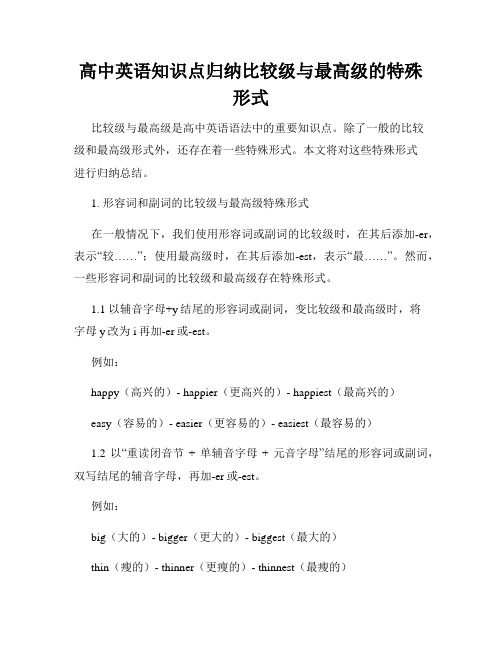
高中英语知识点归纳比较级与最高级的特殊形式比较级与最高级是高中英语语法中的重要知识点。
除了一般的比较级和最高级形式外,还存在着一些特殊形式。
本文将对这些特殊形式进行归纳总结。
1. 形容词和副词的比较级与最高级特殊形式在一般情况下,我们使用形容词或副词的比较级时,在其后添加-er,表示“较……”;使用最高级时,在其后添加-est,表示“最……”。
然而,一些形容词和副词的比较级和最高级存在特殊形式。
1.1 以辅音字母+y结尾的形容词或副词,变比较级和最高级时,将字母y改为i再加-er或-est。
例如:happy(高兴的)- happier(更高兴的)- happiest(最高兴的)easy(容易的)- easier(更容易的)- easiest(最容易的)1.2 以“重读闭音节+ 单辅音字母+ 元音字母”结尾的形容词或副词,双写结尾的辅音字母,再加-er或-est。
例如:big(大的)- bigger(更大的)- biggest(最大的)thin(瘦的)- thinner(更瘦的)- thinnest(最瘦的)1.3 部分形容词和副词的比较级和最高级形式是不规则的,需要直接记忆。
例如:good(好的)- better(更好的)- best(最好的)bad(坏的)- worse(更坏的)- worst(最坏的)many(多的)- more(更多的)- most(最多的)2. 不规则的比较级和最高级形式除了上述特殊形式外,还有一些形容词和副词的比较级和最高级形式是不规则的。
2.1 在不规则的形容词和副词的变化中,比较级和最高级的形式与词义有关,需要记忆。
例如:good(好的)- better(更好的)- best(最好的)bad(糟糕的)- worse(更糟糕的)- worst(最糟糕的)far(远的)- farther/further(更远的)- farthest/furthest(最远的)2.2 有一些形容词和副词的比较级和最高级形式是相同的,只通过上下文来区分。
高中英语的比较级和最高级用法总结
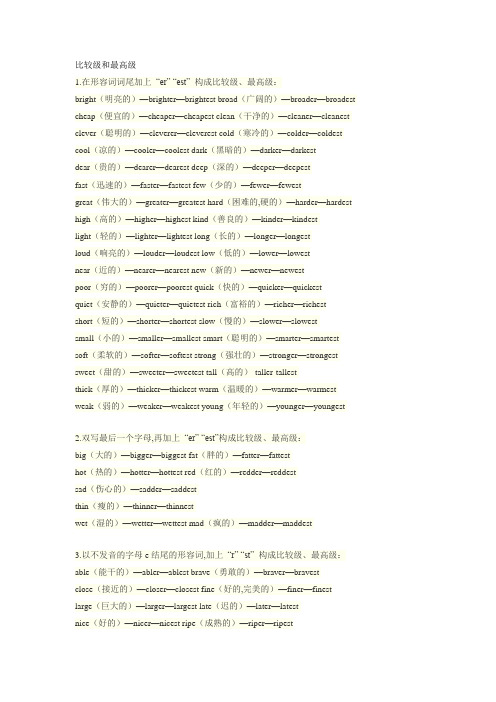
比较级和最高级1.在形容词词尾加上“er” “est” 构成比较级、最高级:bright(明亮的)—brighter—brightest broad(广阔的)—broader—broadest cheap(便宜的)—cheaper—cheapest clean(干净的)—cleaner—cleanest clever(聪明的)—cleverer—cleverest cold(寒冷的)—colder—coldest cool(凉的)—cooler—coolest dark(黑暗的)—darker—darkestdear(贵的)—dearer—dearest deep(深的)—deeper—deepestfast(迅速的)—faster—fastest few(少的)—fewer—fewestgreat(伟大的)—greater—greatest hard(困难的,硬的)—harder—hardest high(高的)—higher—highest kind(善良的)—kinder—kindestlight(轻的)—lighter—lightest long(长的)—longer—longestloud(响亮的)—louder—loudest low(低的)—lower—lowestnear(近的)—nearer—nearest new(新的)—newer—newestpoor(穷的)—poorer—poorest quick(快的)—quicker—quickestquiet(安静的)—quieter—quietest rich(富裕的)—richer—richestshort(短的)—shorter—shortest slow(慢的)—slower—slowestsmall(小的)—smaller—smallest smart(聪明的)—smarter—smartest soft(柔软的)—softer—softest strong(强壮的)—stronger—strongest sweet(甜的)—sweeter—sweetest tall(高的)-taller-tallestthick(厚的)—thicker—thickest warm(温暖的)—warmer—warmest weak(弱的)—weaker—weakest young(年轻的)—younger—youngest2.双写最后一个字母,再加上“er” “est”构成比较级、最高级:big(大的)—bigger—biggest fat(胖的)—fatter—fattesthot(热的)—hotter—hottest red(红的)—redder—reddestsad(伤心的)—sadder—saddestthin(瘦的)—thinner—thinnestwet(湿的)—wetter—wettest mad(疯的)—madder—maddest3.以不发音的字母e结尾的形容词,加上“r” “st” 构成比较级、最高级:able(能干的)—abler—ablest brave(勇敢的)—braver—bravestclose(接近的)—closer—closest fine(好的,完美的)—finer—finestlarge(巨大的)—larger—largest late(迟的)—later—latestnice(好的)—nicer—nicest ripe(成熟的)—riper—ripestrude(粗鲁的)—ruder—rudest safe(安全的)—safer—safeststrange(奇怪的)—stranger—strangest wide(宽广的)—wider—widestwise(睿智的,聪明的)—wiser—wisestwhite(白的)—whiter—whitest4.以字母y结尾的形容词,把y改为i,再加上“er”“est”构成比较级、最高级:busy(忙碌的)—busier—busiest dirty(脏的)—dirtier—dirtiestdry(干燥的)—drier—driest early(早的)—earlier—earliesteasy(容易的)—easier—easiest friendly(友好的)—friendlier—friendliest funny(好玩的)—funnier—funniest happy(开心的)—happier—happiest healthy(健康的)—healthier—healthiest heavy(重的)—heavier—heaviest hungry(饿的)—hungrier—hungriest lazy(懒惰的)—lazier—laziestlucky(幸运的)—luckier—luckiest naughty(调皮的)—naughtier—naughtiest noisy(嘈杂的)—noisier—noisiest pretty(美丽的)—prettier—prettiestsilly(傻的)—sillier—silliest spicy(辣的)—spicier—spiciestthirsty(渴的)—thirstier—thirstiest ugly(丑的)—uglier—ugliest5.双音节、多音节形容词,在单词前面加上“more” “most”构成比较级、最高级:afraid(害怕的)—more afraid—most afraidbeautiful(美丽的)—more beautiful—most beautifulcareful(仔细的)—more careful—most carefulcheerful(开心的)—more cheerful—most cheerfulcrowded(拥挤的)—more crowded—most crowdeddangerous(危险的)—more dangerous—most dangerousdelicious(美味的)—more delicious—most deliciousdifficult(困难的)—more difficult—most difficultexciting(令人兴奋的)—more exciting—most excitingexpensive(昂贵的)—more expensive—most expensivefamous(著名的)—more famous—most famousfrightened(受惊的)—more frightened—most frightenedfrightening(令人害怕的)—more frightening—most frighteninghard-working(勤奋的)—more hard-working—most hard-workinghelpful(有帮助的)—more helpful—most helpfulhonest(诚实的)—more honest—most honestimportant(重要的)—more important—most importantinteresting(有趣的)—more interesting—most interestingpolite(有礼貌的)—more polite—most politeterrible(可怕的)—more terrible—most terribletired(累的)—more tired—most tired6.不规则变化的形容词:bad(坏的)—worse—worstfar(远的)—farther—farthest(far—further—furthest)good(好的)—better—bestill(病的)—worse—worstlittle(少的)—less—leastmany(多的)—more—most much(多的)—more—mostold(年老的)—older—oldest ( old—elder—eldest) well(好的,身体好的)—better—best 原级用法: as + adj/ adv.的原级+ as , 否定式(not) so…as…只能修饰原级的词,very,quite,so,tooeg. The ruler is as long as that one.He sings as well as Jack.He doesn’t sing as(so) well as Jack.形容词比较级的用法:形容词的比较级用于两个人或事物的比较, 结构形式如下:1. A + is/ am/ are + 形容词比较级+ than + BShe is taller than I.Tom is more athletic than Sam.It is _________________today than it was yesterday. 今天的天气比昨天暖和。
高中语法专题解析比较级与最高级
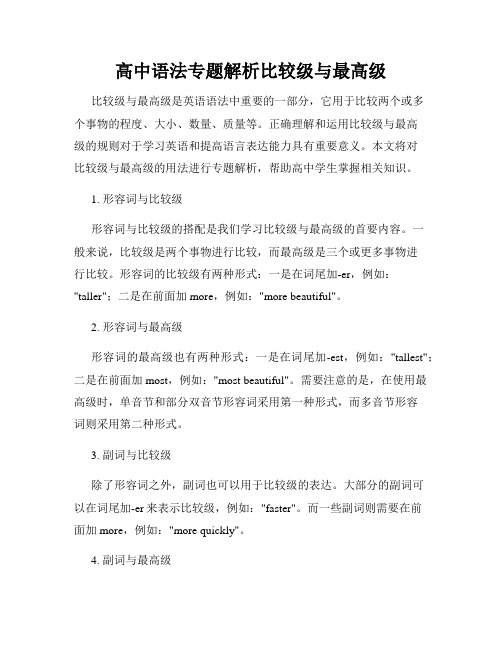
高中语法专题解析比较级与最高级比较级与最高级是英语语法中重要的一部分,它用于比较两个或多个事物的程度、大小、数量、质量等。
正确理解和运用比较级与最高级的规则对于学习英语和提高语言表达能力具有重要意义。
本文将对比较级与最高级的用法进行专题解析,帮助高中学生掌握相关知识。
1. 形容词与比较级形容词与比较级的搭配是我们学习比较级与最高级的首要内容。
一般来说,比较级是两个事物进行比较,而最高级是三个或更多事物进行比较。
形容词的比较级有两种形式:一是在词尾加-er,例如:"taller";二是在前面加more,例如:"more beautiful"。
2. 形容词与最高级形容词的最高级也有两种形式:一是在词尾加-est,例如:"tallest";二是在前面加most,例如:"most beautiful"。
需要注意的是,在使用最高级时,单音节和部分双音节形容词采用第一种形式,而多音节形容词则采用第二种形式。
3. 副词与比较级除了形容词之外,副词也可以用于比较级的表达。
大部分的副词可以在词尾加-er来表示比较级,例如:"faster"。
而一些副词则需要在前面加more,例如:"more quickly"。
4. 副词与最高级与形容词相似,副词的最高级形式也有两种:一是在词尾加-est,例如:"fastest";二是在前面加most,例如:"most quickly"。
同样,单音节和部分双音节副词采用第一种形式,多音节副词采用第二种形式。
5. 不规则变化的比较级和最高级除了规则变化的形容词和副词,还存在一些比较级和最高级的不规则变化。
例如:"good-better-best"和"bad-worse-worst",这些不规则变化的形式需要我们进行单独记忆和掌握。
高中英语知识点归纳副词的比较级和最高级

高中英语知识点归纳副词的比较级和最高级副词的比较级和最高级是高中英语中比较重要的语法知识点之一。
熟练掌握副词的比较级和最高级用法不仅有助于提升学生的语言表达能力,还能帮助他们在阅读和听力等方面更好地理解英语文章。
本文将对副词的比较级和最高级进行归纳总结。
一、什么是比较级和最高级在英语中,副词有时需要表示一种程度的比较。
这就诞生了比较级和最高级这两个概念。
比较级用于两者之间的比较,最高级则用于三者或三者以上的比较。
比较级和最高级的形式通常由词尾的变化或加上前缀或后缀来实现。
二、比较级和最高级的构成方式1. 比较级的构成方式:①一般情况下,在副词后面加上“-er”来构成比较级,如“faster”(更快地)、“higher”(更高地)。
②对于以字母“e”结尾的副词,只需加上“-r”即可,如“nicer”(更友好地)。
③原形以辅音字母 + 元音字母 + 辅音字母结尾的双音节副词,要先双写末尾的辅音字母再加上“-er”,如“bigger”(更大地)。
④如果副词以“y”结尾,则需要将“y”改为“i”,再加上“-er”,如“happier”(更快乐地)。
2. 最高级的构成方式:①一般情况下,在比较级前加上“the”再加上“-est”来构成最高级,如“the fastest”(最快的)、“the highest”(最高的)。
②对于以“e”结尾的副词,只需加上“-st”即可,如“the nicest”(最友好的)。
③原形以辅音字母 + 元音字母 + 辅音字母结尾的双音节副词,要先双写末尾的辅音字母再加上“-est”,如“the biggest”(最大的)。
④如果副词以“y”结尾,则需要将“y”改为“i”,再加上“-est”,如“the happiest”(最快乐的)。
三、比较级和最高级的用法1. 比较级的用法:①表示两者之间的比较时,前面的一般是“than”结构,在后面加上比较级,如“She runs faster than him.”(她跑得比他快)。
高中英语知识点归纳比较级与最高级的用法总结
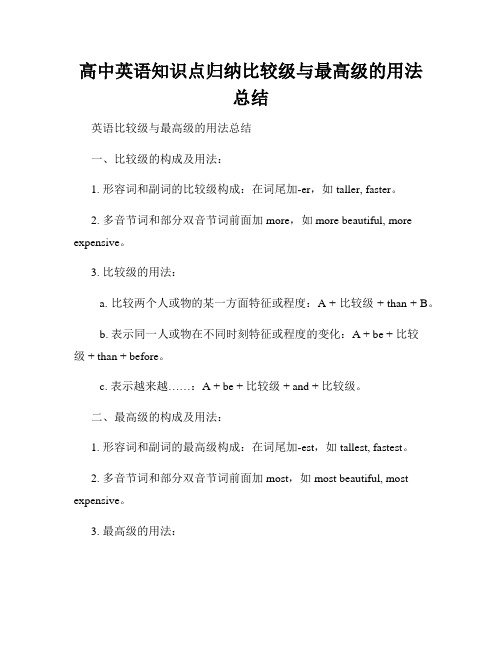
高中英语知识点归纳比较级与最高级的用法总结英语比较级与最高级的用法总结一、比较级的构成及用法:1. 形容词和副词的比较级构成:在词尾加-er,如taller, faster。
2. 多音节词和部分双音节词前面加more,如more beautiful, more expensive。
3. 比较级的用法:a. 比较两个人或物的某一方面特征或程度:A + 比较级 + than + B。
b. 表示同一人或物在不同时刻特征或程度的变化:A + be + 比较级 + than + before。
c. 表示越来越……:A + be + 比较级 + and + 比较级。
二、最高级的构成及用法:1. 形容词和副词的最高级构成:在词尾加-est,如tallest, fastest。
2. 多音节词和部分双音节词前面加most,如most beautiful, most expensive。
3. 最高级的用法:a. 比较三个或三个以上人或物的某一方面特征或程度:A + the + 最高级 + of + 所有比较对象。
b. 表示同一人或物在某一方面特征或程度的最高水平:A + be + the + 最高级 + 所有比较对象。
三、特殊用法:1. "比较级 + and + 比较级" 表示越来越……,如The more you practice, the better you get.(练习得越多,进步越大)2. "the + 比较级,the + 比较级" 表示越……越……,如The earlier you come, the better seat you can get.(你来得越早,就能得到越好的座位)四、常见比较级和最高级的形容词和副词:1. 比较级:bigger, faster, taller, more beautiful, more expensive, more interesting。
高中英语知识点归纳比较级与最高级的用法
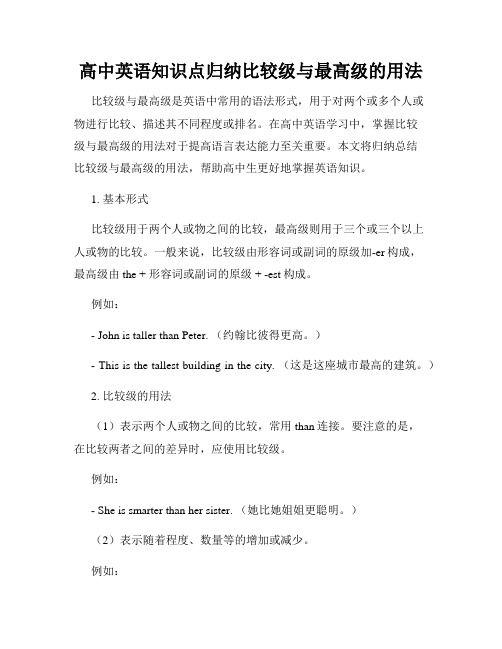
高中英语知识点归纳比较级与最高级的用法比较级与最高级是英语中常用的语法形式,用于对两个或多个人或物进行比较、描述其不同程度或排名。
在高中英语学习中,掌握比较级与最高级的用法对于提高语言表达能力至关重要。
本文将归纳总结比较级与最高级的用法,帮助高中生更好地掌握英语知识。
1. 基本形式比较级用于两个人或物之间的比较,最高级则用于三个或三个以上人或物的比较。
一般来说,比较级由形容词或副词的原级加-er构成,最高级由the + 形容词或副词的原级 + -est构成。
例如:- John is taller than Peter. (约翰比彼得更高。
)- This is the tallest building in the city. (这是这座城市最高的建筑。
)2. 比较级的用法(1)表示两个人或物之间的比较,常用than连接。
要注意的是,在比较两者之间的差异时,应使用比较级。
例如:- She is smarter than her sister. (她比她姐姐更聪明。
)(2)表示随着程度、数量等的增加或减少。
例如:- The homework is getting more difficult. (这个作业越来越难。
)- He eats less junk food now. (他现在吃得越来越少垃圾食品。
)(3)表示同时进行的动作或状态的不同程度。
例如:- I studied harder while he played games. (我越努力学习,他就越玩游戏。
)3. 最高级的用法(1)表示三个或三个以上人或物中的最高程度,常用the + 最高级。
例如:- He is the fastest runner in our class. (他是我们班最快的跑步者。
)(2)与特定范围或群体进行比较。
例如:- English is the most widely spoken language in the world. (英语是世界上使用最广泛的语言。
高中英语知识点归纳比较级和最高级的常见用法
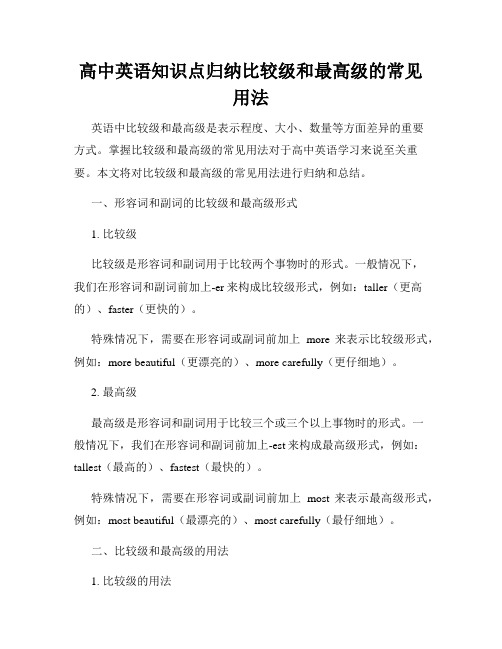
高中英语知识点归纳比较级和最高级的常见用法英语中比较级和最高级是表示程度、大小、数量等方面差异的重要方式。
掌握比较级和最高级的常见用法对于高中英语学习来说至关重要。
本文将对比较级和最高级的常见用法进行归纳和总结。
一、形容词和副词的比较级和最高级形式1. 比较级比较级是形容词和副词用于比较两个事物时的形式。
一般情况下,我们在形容词和副词前加上-er来构成比较级形式,例如:taller(更高的)、faster(更快的)。
特殊情况下,需要在形容词或副词前加上more来表示比较级形式,例如:more beautiful(更漂亮的)、more carefully(更仔细地)。
2. 最高级最高级是形容词和副词用于比较三个或三个以上事物时的形式。
一般情况下,我们在形容词和副词前加上-est来构成最高级形式,例如:tallest(最高的)、fastest(最快的)。
特殊情况下,需要在形容词或副词前加上most来表示最高级形式,例如:most beautiful(最漂亮的)、most carefully(最仔细地)。
二、比较级和最高级的用法1. 比较级的用法比较级常用于以下情况:- 表示两个人或两个物品之间的比较。
例如:Tom is taller than John.(汤姆比约翰高。
)- 表示两个动作之间的比较。
例如:She runs faster than him.(她跑得比他快。
)- 表示两个性质不同的事物之间的比较。
例如:Learning English is more difficult than learning Chinese.(学习英语比学习中文更难。
)2. 最高级的用法最高级常用于以下情况:- 表示三个或三个以上人或物之间的比较。
例如:She is the tallest girl in the class.(她是班里最高的女孩。
)- 表示某一事物在同一范围内的最高程度。
例如:This is the most beautiful place I have ever seen.(这是我见过的最美丽的地方。
高中英语语法比较级和最高级讲解
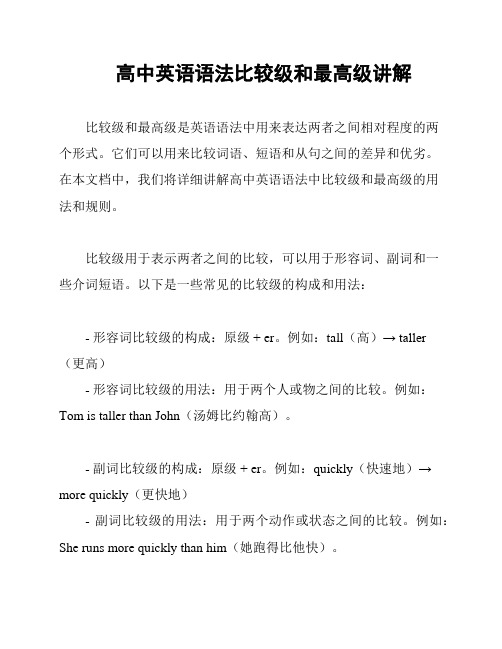
高中英语语法比较级和最高级讲解比较级和最高级是英语语法中用来表达两者之间相对程度的两个形式。
它们可以用来比较词语、短语和从句之间的差异和优劣。
在本文档中,我们将详细讲解高中英语语法中比较级和最高级的用法和规则。
比较级用于表示两者之间的比较,可以用于形容词、副词和一些介词短语。
以下是一些常见的比较级的构成和用法:- 形容词比较级的构成:原级 + er。
例如:tall(高)→ taller(更高)- 形容词比较级的用法:用于两个人或物之间的比较。
例如:Tom is taller than John(汤姆比约翰高)。
- 副词比较级的构成:原级 + er。
例如:quickly(快速地)→ more quickly(更快地)- 副词比较级的用法:用于两个动作或状态之间的比较。
例如:She runs more quickly than him(她跑得比他快)。
- 一些介词短语比较级的用法:例如:in the same way(以相同的方式)、more than(比...更多)等。
2. 最高级(Superlative)最高级用于表示三者或三者以上之间的比较,可以用于形容词、副词和一些介词短语。
以下是一些常见的最高级的构成和用法:- 形容词最高级的构成:原级 + est。
例如:tall(高)→ tallest (最高的)- 形容词最高级的用法:用于三个或三个以上的人或物之间的比较。
例如:Tom is the tallest in the class(汤姆是班级里最高的)。
- 副词最高级的构成:原级 + est。
例如:quickly(快速地)→ most quickly(最快地)- 副词最高级的用法:用于三个或三个以上的动作或状态之间的比较。
例如:She runs the most quickly in the team(她在团队中跑得最快)。
- 一些介词短语最高级的用法:例如:in the same way(以相同的方式)、the most(最多)等。
高中英语知识点归纳比较级和最高级的用法注意事项总结
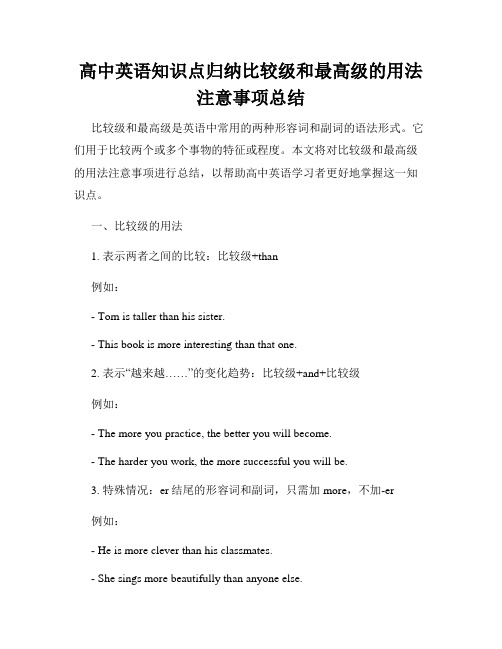
高中英语知识点归纳比较级和最高级的用法注意事项总结比较级和最高级是英语中常用的两种形容词和副词的语法形式。
它们用于比较两个或多个事物的特征或程度。
本文将对比较级和最高级的用法注意事项进行总结,以帮助高中英语学习者更好地掌握这一知识点。
一、比较级的用法1. 表示两者之间的比较:比较级+than例如:- Tom is taller than his sister.- This book is more interesting than that one.2. 表示“越来越……”的变化趋势:比较级+and+比较级例如:- The more you practice, the better you will become.- The harder you work, the more successful you will be.3. 特殊情况:er结尾的形容词和副词,只需加more,不加-er例如:- He is more clever than his classmates.- She sings more beautifully than anyone else.4. 某些形容词和副词的比较级形式是不规则的,需要进行记忆和练习例如:- good - better- bad - worse- well - better- little - less二、最高级的用法1. 表示三者或三者以上之间的比较:the+最高级+of例如:- This is the most beautiful flower of all.- She is the smartest student in the class.2. 表示“非常……”:形容词或副词最高级+that/ever例如:- He is the kindest person that I have ever met.- That is the most delicious cake ever!3. 某些形容词和副词的最高级形式是不规则的,需要进行记忆和练习例如:- good - best- bad - worst- well - best- little - least三、比较级和最高级的注意事项1. 形容词和副词的比较级和最高级用法需要根据具体的语境来确定,注意前后事物的对比关系和上下文的要求。
(完整)比较级最高级

(一 )比较级和最高级的构成:1 加-er,-est 构成比较级和最高级。
【1】单音节形容词和副词high-higher-highest hard-harder-hardest 【2】以不发音的 -e 结尾的safe-safer-safest late-later-latest【3】辅音字母要双写的情况:【4】以辅音加 -y 结尾的情况dry-drier-driest merry-merrier-merrist 2 加 more,most 构成比较级和最高级。
【1】多音节的形容词和副词expensive-more expensive-most expensivecarefully-more carefully-most carefully【2】由形容词加 -ly 构成的副词slowly-more slowly-most slowlyhighly-more highly-most highly【3】以-ful,-less,-able,-ous,-ive,-ing 等结尾的双音节形容词useless-more useless-most uselessserious-more serious-most seriuos【4】分词形容词 tired,pleased 及 glad,often,real,right,wrong 等单音节形容词tired-more tired-most tiredglad-more glad-most glad( 3 )形容词、副词的比较级和最高级的不规则构成法。
bad/ill/badly-worse-worstmany/much-more-mostlittle-less-leastfar-farther/further-farthest/furthestold-older/elder-oldest/eldest(二) 比较级和最高级的用法1 比较级的表示法:主语 +be +比较级+than …;主语+谓语+比较级+than …( 1 )不同主语的比较:He is two years younger than I.This machine works better than that one.Li Ming studies harder than Wang Ling.( 2 )同一主语不同方面的比较:She is now happier than she has ever been.The exam was easier than we expected.We have had much more rain this year than last year.( 3 )用于修饰比较级的词: even,(very) much,far,a lot,stillThis book is much thicker than that one.He works even harder than before.( 1 ) 形容词和副词最高级的用法三者或三者以上的比较用最高级。
(完整版)高中英语的比较级和最高级用法总结
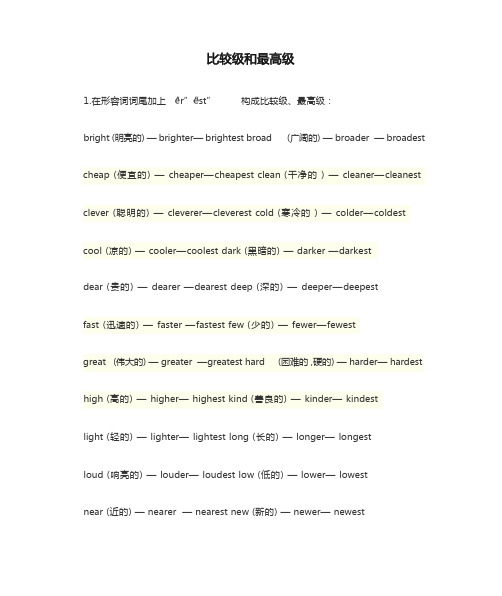
1.在形容词词尾加上r”st” 构成比较级、最高级:bright (明亮的) — brighter— brightest broad (广阔的) — broader — broadest cheap (便宜的) — cheaper—cheapest clean (干净的 ) — cleaner—cleanest clever (聪明的) — cleverer—cleverest cold (寒冷的 ) — colder—coldest cool (凉的) — cooler—coolest dark (黑暗的) — darker —darkestdear (贵的) — dearer —dearest deep (深的) — deeper—deepestfast (迅速的) — faster —fastest few (少的) — fewer—fewestgreat (伟大的) — greater —greatest hard (困难的 ,硬的) — harder— hardest high (高的) — higher— highest kind (善良的) — kinder— kindestlight (轻的) — lighter— lightest long (长的) — longer— longestloud (响亮的) — louder— loudest low (低的) — lower— lowestnear (近的) — nearer — nearest new (新的) — newer— newestpoor (穷的) — poorer — poorest quick (快的) — quicker —quickest quiet (安静的) — quieter—quietest rich (富裕的) — richer— richest short (短的) — shorter—shortest slow (慢的) — slower—slowestsmall (小的) — smaller—smallest smart (聪明的) — smarter—smartest soft (柔软的) — softer —softest strong (强壮的) — stronger—strongest sweet (甜的) — sweeter—sweetest tall (高的) -taller-tallestthick (厚的) — thicker —thickest warm (温暖的 ) — warmer—warmest weak (弱的) —weaker —weakest young (年轻的 ) — younger—youngest 2.双写最后一个字母,再加上r”st”构成比较级、最高级:big (大的) — bigger— biggest fat (胖的) — fatter—fattesthot (热的) — hotter— hottest red (红的) — redder — reddestsad (伤心的) — sadder—saddestthin (瘦的) — thinner—thinnest3.以不发音的字母 e 结尾的形容词,加上“r” “st” 构成比较级、最高级:able (能干的) — abler—ablest brave (勇敢的) — braver — bravestclose (接近的) — closer—closest fine (好的,完美的) — finer—finest large (巨大的) — larger — largest late (迟的) — later— latestnice (好的) — nicer— nicest ripe (成熟的) — riper— ripestrude (粗鲁的 ) — ruder— rudest safe (安全的) — safer—safeststrange (奇怪的) — stranger—strangest wide (宽广的) — wider—widest wise (睿智的 ,聪明的) —wiser—wisestwhite (白的)—whiter—whitest4.以字母 y 结尾的形容词 ,把 y 改为 i,再加上“er”st”构成比较级、最高级:busy (忙碌的) — busier— busiest dirty (脏的) — dirtier—dirtiestdry (干燥的 ) — drier—driest early (早的) — earlier—earliesteasy (容易的) — easier—easiest friendly (友好的) — friendlier—friendliest funny (好玩的) — funnier—funniest happy (开心的) — happier— happiest healthy (健康的) — healthier— healthiest heavy (重的) — heavier— heaviest hungry (饿的) — hungrier— hungriest lazy (懒惰的 ) — lazier— laziestlucky(幸运的) — luckier— luckiest naughty (调皮的) — naughtier— naughtiest noisy (嘈杂的) — noisier— noisiest pretty (美丽的) — prettier— prettiestsilly (傻的) — sillier—silliest spicy (辣的) — spicier—spiciestthirsty (渴的) — thirstier—thirstiest ugly (丑的) — uglier— ugliest5.双音节、多音节形容词 ,在单词前面加上m“ore”m“ost”构成比较级、最高级:afraid (害怕的) — more afraid— most afraidbeautiful (美丽的) — more beautiful — most beautifulcareful (仔细的) — more careful — most carefulcheerful (开心的) — more cheerful— most cheerfulcrowded (拥挤的) — more crowded — most crowdeddangerous (危险的) — more dangerous — most dangerous delicious (美味的) — more delicious — most deliciousdifficult (困难的) — more difficult — most difficultexciting (令人兴奋的) — more exciting — most exciting expensive (昂贵的) — more expensive — most expensivefamous (著名的) — more famous — most famousfrightened (受惊的) — more frightened — most frightened frightening (令人害怕的) — more frightening — most frightening hard-working (勤奋的) — more hard-working — most hard-working helpful (有帮助的) — more helpful — most helpfulhonest (诚实的) — more honest — most honestimportant (重要的) — more important — most important interesting (有趣的) — more interesting — most interesting polite (有礼貌的 ) — more polite — most politeterrible (可怕的) — more terrible — most terribletired (累的) — more tired — most tired6.不规则变化的形容词:bad (坏的) —worse—worstfar (远的) — farther—farthest (far—further—furthest)good (好的) — better— bestill (病的)—worse—worstlittle (少的) — less— leastmany (多的) — more — most much (多的) — more — mostold ( 年老的 ) — older—oldest ( old—elder—eldest) well ( 好的 ,身体好的 )— better— best原级用法: as +adj/adv. 的原级+ as , 否定式 (not) so…as…只能修饰原级的词, very ,quite ,so ,tooeg. The ruler is as long as that one.He sings as well as Jack.He doesn’t sing as(so) well as Jack.形容词比较级的用法:形容词的比较级用于两个人或事物的比较 , 结构形式如下:1. A + is/ am/ are + 形容词比较级 + than + BShe is taller than I.Tomis more athletic thanSam.It is _________________today than it was yesterday. 今天的天气比昨天暖和。
比较级(完整版)
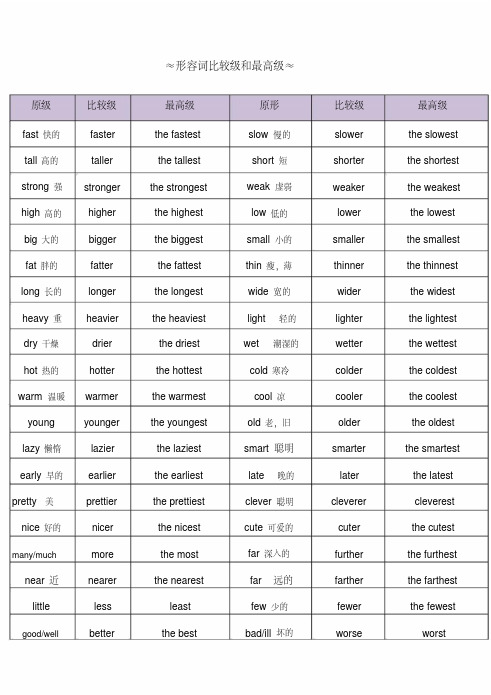
≈形容词比较级和最高级≈原级比较级最高级原形比较级最高级fast 快的faster the fastest slow 慢的slower the slowest tall 高的taller the tallest short 短shorter the shortest strong 强stronger the strongest weak 虚弱weaker the weakest high 高的higher the highest low 低的lower the lowest big 大的bigger the biggest small 小的smaller the smallest fat 胖的fatter the fattest thin 瘦,薄thinner the thinnest long 长的longer the longest wide 宽的wider the widest heavy 重heavier the heaviest light轻的lighter the lightest dry 干燥drier the driest wet潮湿的wetter the wettest hot 热的hotter the hottest cold 寒冷colder the coldest warm 温暖warmer the warmest cool 凉cooler the coolest young younger the youngest old 老,旧older the oldest lazy 懒惰lazier the laziest smart 聪明smarter the smartest early 早的earlier the earliest late晚的later the latest pretty 美prettier the prettiest clever 聪明cleverer cleverest nice 好的nicer the nicest cute 可爱的cuter the cutest many/much more the most far 深入的further the furthest near 近nearer the nearest far远的farther the farthest little less least few 少的fewer the fewest good/well better the best bad/ill 坏的worse worst原级比较级最高级原级比较级最高级安静的困难的quiet quieter the quietest difficult more difficult the most difficult 丑陋的漂亮的ugly uglier the ugliest beautiful more beautiful the most beautiful 大的危险的large larger the largest dangerous more dangerous the most dangerous 有趣的幽默的funny funnier the funniest humorous more humorous the most humorous 高兴的高兴地happy happier the happiest happily more happily the most happily 忙碌的可口的busy busier the busiest delicious more delicious the most delicious 脏的细心的dirty dirtier the dirtiest careful more careful the most careful 明亮的有帮助的bright brighter the brightest helpful more helpful the most helpful 便宜的昂贵的cheap cheaper the cheapest expensive more expensive the most expensive 快的( adj.)快地( adv.)quick quicker the quickest quickly more quickly the most quickly 大声的不同的loud louder the loudest different more different the most different 巨大的特别的huge huger the hugest special more special the most special 干净的重要的clean cleaner the cleanest important more important the most important原形比较级最高级原形/原级比较级最高级新的著名的new newer the newest famous more famous the most famous 勇敢的激动人心的brave braver the bravest exciting more exciting the most exciting 健康的疲累的healthy healthier the healthiest tired more tired the most tired 容易的( adj.)容易地( adv. )easy easier the easiest easily more easily the most easily 善良的,友好的有趣的kind kinder the kindest interesting more interesting the most interesting 坚硬的,费力的,辛苦的礼貌的hard harder the hardest polite more polite the most polite 柔软的枯燥的,乏味的soft softer the softest boring more boring the most boring 经常的恐怖的,令人害怕的often oftener the oftenest frightening more frightening the most frightening 厚的有用的thick thicker the thickest useful more useful the most useful用功的,勤奋的hard-working more hard-working the most hard-working。
(完整版)英语比较级和最高级
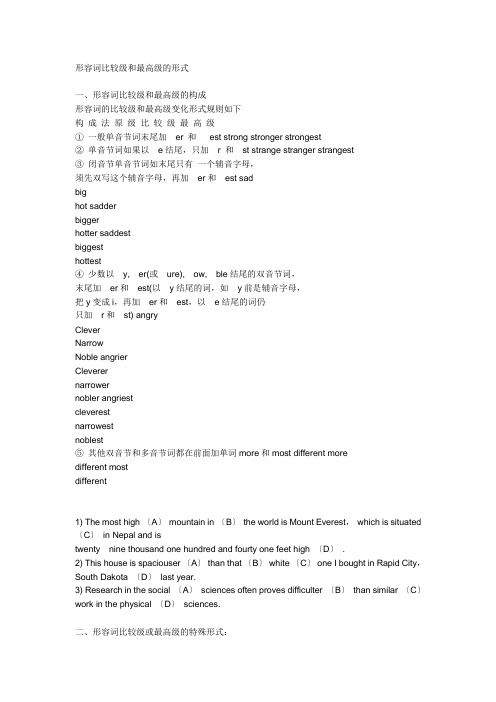
形容词比较级和最高级的形式一、形容词比较级和最高级的构成形容词的比较级和最高级变化形式规则如下构成法原级比较级最高级①一般单音节词末尾加er 和est strong stronger strongest②单音节词如果以e结尾,只加r 和st strange stranger strangest③闭音节单音节词如末尾只有一个辅音字母,须先双写这个辅音字母,再加er和est sadbighot sadderbiggerhotter saddestbiggesthottest④少数以y,er(或ure),ow,ble结尾的双音节词,末尾加er和est(以y结尾的词,如y前是辅音字母,把y变成i,再加er和est,以e结尾的词仍只加r和st) angryCleverNarrowNoble angrierCleverernarrowernobler angriestcleverestnarrowestnoblest⑤其他双音节和多音节词都在前面加单词more和most different moredifferent mostdifferent1) The most high 〔A〕mountain in 〔B〕the world is Mount Everest,which is situated 〔C〕in Nepal and istwenty nine thousand one hundred and fourty one feet high 〔D〕 .2) This house is spaciouser 〔A〕than that 〔B〕white 〔C〕one I bought in Rapid City,South Dakota 〔D〕last year.3) Research in the social 〔A〕sciences often proves difficulter 〔B〕than similar 〔C〕work in the physical 〔D〕sciences.二、形容词比较级或最高级的特殊形式:1. 三个或三个以上音节的形容词只能加more和most只能说more beautiful而不能说beautifuller; 只能说the most beautiful而不能说beautifullest。
高中语法中的比较级与最高级
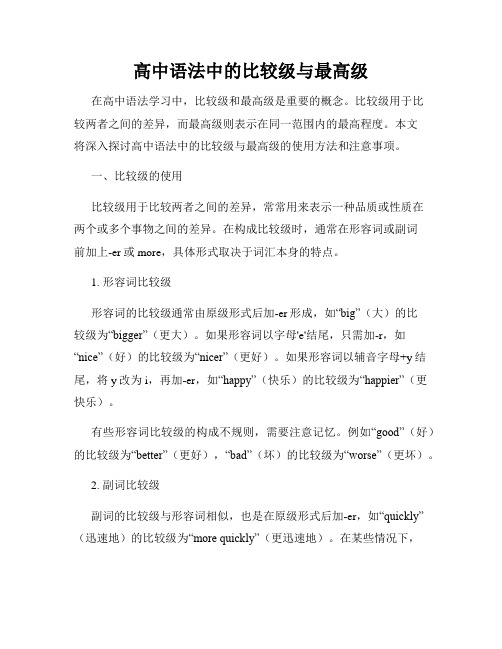
高中语法中的比较级与最高级在高中语法学习中,比较级和最高级是重要的概念。
比较级用于比较两者之间的差异,而最高级则表示在同一范围内的最高程度。
本文将深入探讨高中语法中的比较级与最高级的使用方法和注意事项。
一、比较级的使用比较级用于比较两者之间的差异,常常用来表示一种品质或性质在两个或多个事物之间的差异。
在构成比较级时,通常在形容词或副词前加上-er或more,具体形式取决于词汇本身的特点。
1. 形容词比较级形容词的比较级通常由原级形式后加-er形成,如“big”(大)的比较级为“bigger”(更大)。
如果形容词以字母'e'结尾,只需加-r,如“nice”(好)的比较级为“nicer”(更好)。
如果形容词以辅音字母+y结尾,将y改为i,再加-er,如“happy”(快乐)的比较级为“happier”(更快乐)。
有些形容词比较级的构成不规则,需要注意记忆。
例如“good”(好)的比较级为“better”(更好),“bad”(坏)的比较级为“worse”(更坏)。
2. 副词比较级副词的比较级与形容词相似,也是在原级形式后加-er,如“quickly”(迅速地)的比较级为“more quickly”(更迅速地)。
在某些情况下,可以使用副词的原级形式前加more来表示比较级,如“often”(经常)的比较级可以说成“more often”(更经常)。
需要注意的是,有些副词的比较级构成不规则,也需要记忆。
例如“well”(好地)的比较级为“better”(更好地),“badly”(糟糕地)的比较级为“worse”(更糟糕地)。
二、最高级的使用最高级用于表示某一事物在一组事物中达到了最高程度。
与比较级类似,最高级的形式多由形容词或副词的原级形式后加-est或most构成。
1. 形容词最高级形容词最高级的构成规则与比较级略有不同。
通常在形容词前加上-the,再加上-est,如“big”(大)的最高级为“the biggest”(最大)。
高中英语知识点归纳副词的比较级与最高级

高中英语知识点归纳副词的比较级与最高级副词是英语中的重要词类之一,用来修饰动词、形容词和其他副词等。
在副词中,比较级和最高级是用来表示程度或比较关系的一种形式。
掌握副词的比较级和最高级用法对于高中英语学习来说非常重要。
本文将对副词的比较级和最高级进行归纳总结,以帮助学生更好地掌握和应用。
一、比较级的构成及用法比较级用于对两个事物进行比较,表示一个事物在某方面比另一个事物更高或更低的程度。
一般来说,比较级的构成有以下几种情况:1. 单音节副词和部分双音节副词:在副词的词尾加上-er,例如:- fast (快) -> faster (更快)- soon (快) -> sooner (更快)2. 以字母e结尾的副词:在字母e后面加上-r,例如:- large (大) -> larger (更大)- wide (宽) -> wider (更宽)3. 以辅音字母+y结尾的副词:将y变为i,再加上-er,例如:- easy (容易) -> easier (更容易)- happy (快乐) -> happier (更快乐)4. 多音节副词和部分双音节副词:在前面加上more,例如:- carefully (小心地) -> more carefully (更小心地)- suddenly (突然) -> more suddenly (更突然)需要注意的是,有些副词的比较级是不规则的,比如:- well (好) -> better (更好)- badly (坏) -> worse (更坏)在具体应用时,比较级可以用于修饰动词、形容词或副词,例如:- She sings better than him. (她唱歌比他好。
)- The weather is getting colder and colder. (天气越来越冷。
)- He speaks English more fluently than his brother. (他英语说得比他哥哥流利。
高中英语知识点归纳比较级和最高级的用法
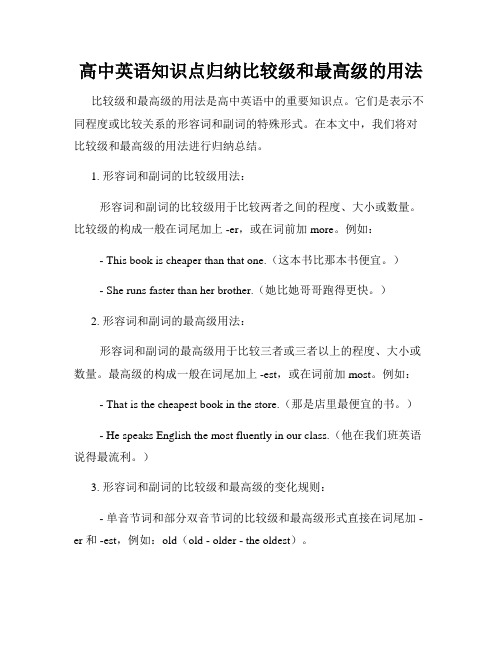
高中英语知识点归纳比较级和最高级的用法比较级和最高级的用法是高中英语中的重要知识点。
它们是表示不同程度或比较关系的形容词和副词的特殊形式。
在本文中,我们将对比较级和最高级的用法进行归纳总结。
1. 形容词和副词的比较级用法:形容词和副词的比较级用于比较两者之间的程度、大小或数量。
比较级的构成一般在词尾加上 -er,或在词前加 more。
例如: - This book is cheaper than that one.(这本书比那本书便宜。
)- She runs faster than her brother.(她比她哥哥跑得更快。
)2. 形容词和副词的最高级用法:形容词和副词的最高级用于比较三者或三者以上的程度、大小或数量。
最高级的构成一般在词尾加上 -est,或在词前加 most。
例如: - That is the cheapest book in the store.(那是店里最便宜的书。
) - He speaks English the most fluently in our class.(他在我们班英语说得最流利。
)3. 形容词和副词的比较级和最高级的变化规则:- 单音节词和部分双音节词的比较级和最高级形式直接在词尾加 -er 和 -est,例如:old(old - older - the oldest)。
- 以辅音字母+y结尾的词,在变化形式时,需要将 y 变为 i,再加-er 和 -est,例如:happy(happy - happier - the happiest)。
- 以重读闭音节结尾,且末尾只有一个辅音字母的词,需要双写末尾的辅音字母,再加 -er 和 -est,例如:big(big - bigger - the biggest)。
- 部分以字母 e 结尾的词,只需在词尾加 -r 和 -st,例如:late(late - later - the latest)。
- 部分双音节或多音节词,前面加 more 和 most,例如:interesting (more interesting - the most interesting)。
比较级最高级总结归纳
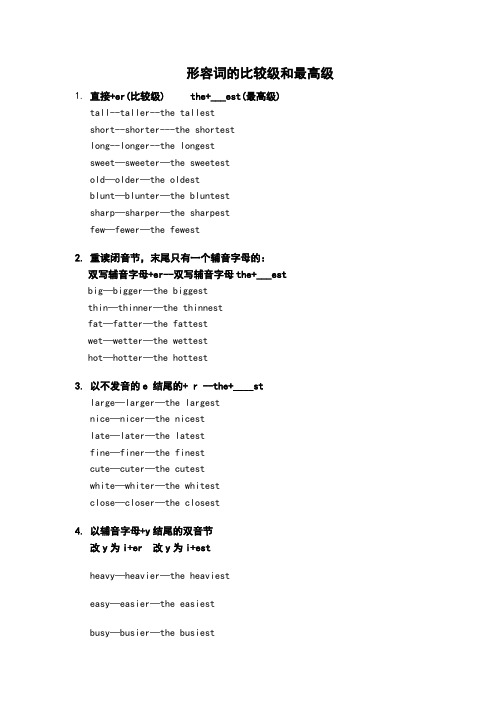
形容词的比较级和最高级1.直接+er(比较级) the+___est(最高级)tall--taller--the tallestshort--shorter---the shortestlong--longer--the longestsweet—sweeter—the sweetestold—older—the oldestblunt—blunter—the bluntestsharp—sharper—the sharpestfew—fewer—the fewest2.重读闭音节,末尾只有一个辅音字母的:双写辅音字母+er--双写辅音字母the+___estbig—bigger—the biggestthin—thinner—the thinnestfat—fatter—the fattestwet—wetter—the wettesthot—hotter—the hottest3.以不发音的e 结尾的+ r --the+____stlarge—larger—the largestnice—nicer—the nicestlate—later—the latestfine—finer—the finestcute—cuter—the cutestwhite—whiter—the whitestclose—closer—the closest4.以辅音字母+y结尾的双音节改y为i+er 改y为i+estheavy—heavier—the heaviesteasy—easier—the easiestbusy—busier—the busiestpretty—prettier—the prettiesthappy—happier—the happiestlazy—lazier—the laziest5.多音节单词在形容词前加more 在形容词前加the mostbeautiful—more beautiful—the most beautifulinteresting—more interesting—the most interestingintelligent—more intelligent—the most intelligentdifficult—more difficult—the most difficultcareful—more careful—the most carefulexciting—more exciting—the most exciting6.不规则变化good—better—the bestbad—worse—the worstmany/much—more—the mostlittle—less—the leastfar(远的)—farther—the farthest句型结构:主语+ be动词+ 形容词的比较级+ than+ 宾语I am taller than Lingling.Jim is fatter than Peter.This dress is prettier than that one. This question is more difficult than that one. This car is better than that one.。
- 1、下载文档前请自行甄别文档内容的完整性,平台不提供额外的编辑、内容补充、找答案等附加服务。
- 2、"仅部分预览"的文档,不可在线预览部分如存在完整性等问题,可反馈申请退款(可完整预览的文档不适用该条件!)。
- 3、如文档侵犯您的权益,请联系客服反馈,我们会尽快为您处理(人工客服工作时间:9:00-18:30)。
形容词比较等级的句型写出下列形容词的比较级和最高级.规律总结:_____________________________________________________________________ 1.表示AB两方程度相同的用_______________如:我的苹果和你的一样红。
My apples are as red as yours.2.表示AB两方程度不同,A不如B的,用_____________________”如:第一课不如第二课有趣。
Lesson One is not so (as) interesting as Lesson Two.练习: 1) Lucy的连衣裙与Lily的一样漂亮。
Lucy’s dress is ______ _________ ______ Lily’s.2) 这个会议没上次的重要。
This meeting is ___ ____ __________ _____ last one.3.表示AB两方程度不同,A超过B的用“___________”如:黑色的猫比白色的那只更饿。
The black cat is hungrier than the white cat.Exercise:1) 今天比昨天更干燥。
Today is _______ _______ yesterday.2) 太阳比月亮大得多。
The sun is _______ _______ _______ the moon.3)他是家里兄弟中最年轻的。
He is _________ _____any other brother in the family.4.表示三个或三个以上进行比较,其中某一方超过其他几方面的用“______________________”如:她是我们班最好的学生。
She is the best student in our class. Exercises:1) 过去她家是村里最穷的。
Her family __ ___ _______in her village in the past.2) 澳大利亚是世界上最富裕的国家之一。
Australia is one of __ ___ ___________in the world.3)他是家里兄弟中最年轻的。
He is _____ ________of the brothers in the family.5.Which / What do you like better, A or B?Which / What do you like best, A, B or C?6.The + 比较级+ of + the +two …如:李明是这两人中更高的一个。
Li Ming is the taller of the two. Exercise: Who is ______, Mr. Green or Mr. Smith?A. very richB. much richerC. the richestD. more richer7.越来越:比较级+and+比较级more and more+原级如:天气越来越热。
_______________________________Our country is more and more beautiful.注意1. 在“比较级+ than”这一句型中,作为比较对象的成分不能省略。
如:在冬天北京比广州更冷。
In winter it’s colder in Beijin g than in Guangzhou. (对)In winter it’s colder in Beijing than Guangzhou. (错)2. 形容词比较等级前一般可用much, even, a lot, a little, a bit,等状语修饰,如:Exercise:1)月亮比太阳小得多。
The moon is ______ _______ ______ the sun.2)这本书比那本书厚一点。
The book is ___ ________ _______ than that one.3. 形容词比较等级前还可以被表示年龄、倍数等词组修饰。
如:She is two years older than Mike.This mountain is 3 times higher than that one.Exercise:1)这个棍子比那根长3米。
This stick is _____ _______ _______ than that one.2)Mary 比Jenny重两公斤。
Mary is ______ _____ heavier than Jenny.拓展:倍数表达1. A + 谓语+倍数+the +n.(size/ height/ length……)+of B2. A + 谓语+倍数+ as + 形容词原级+ as B3. A + 谓语+倍数+形容词比较级+than B例如:This square is twice the size of that one.This square is twice as large as that one.This square is once larger than that one.2. 补充:形容词比较等级的句型还有:1. “as many / few+可数名词复数+as”或“as much / little(少的)+不可数名词+as”。
前者描述数目上的接近,后者描述量的相近。
You may borrow as many books as you can. 你能借多少书就借多少。
“Drink as much water as you can,” the doctor said to him.医生对他说:“你要尽可能的多喝些水。
”2.“主语+比较级+than any other…”结构表示:主语所描述的事物比其他任何一个都……比较级形式表示最高级含义。
Li Ming is much cleverer than any other student in their class.李明是他们班中最聪明的学生。
注意:若比较范围不同,than后应用“any + 可数名词的复数形式+其他”。
China is larger that any countries in Africa.中国比非洲上的任何国家都大。
3. 诸如not, never之类的否定词与形容词或副词的比较级连用, 表示最高级含义,意为“再没有比…更…的了”。
It is not a better idea.这是再好不过的一个办法了。
I have never heard such an interesting story.我从来没有听过比这更有趣的故事了。
4. “形容词+to”结构也可表示比较含义。
This kind of car is superior in quality to that.这种汽车的质量比那一种好得多(superior to意为:优于;胜过)Li ping is three years senior to Liu Gang.李平比刘刚大三岁。
(senior to意为:年长于;资格老于;地位高于)5.“no+比较级+than”结构表示对两个比较对象都进行否定(可由neithe r…nor…结构来改写)。
I’m no more foolish than you. 我们俩都不傻。
(相当于Neither I nor you is foolish.)6. “not more+比较级+than”结构表示在程度上“前者不如后者”This book is not more interesting than that one. 这本书不如那本书有趣。
(相当于: The book is less interesting than that one.)7. “形容词比较级+than+形容词”,意为“与其…倒不如….”Jack is much harder than clever. 与其说杰克聪明,倒不如说他学习用功。
8. would rather…than, prefer…to…,prefer to do…rather than…这三个句型表示“宁愿…而不愿…;喜欢…胜过…宁做…而不愿做…”含义。
虽无比较级形式,但表示比较级含义。
She would rather die than give in. 她宁死不屈。
He preferred to go out rather than stay home. 他宁愿出去也不愿呆在家里。
9. 该结构意为“越…,越…”。
The+比较级…,the+比较级…The more difficult the questions are, the less likely he is able to answer them.问题越难,他回答出来的可能性就越小。
More Exercises1. --Is your headache getting _____?--No, it’s worse.A. betterB. badC. lessD. well2. Americans eat ____ vegetables per person today as they did in 1910.A. more than twiceB. as twice as manyC. twice as many asD. more than twice as many3. In recent years travel companies have succeeded in selling us the idea that the further we go, _____.A. our holiday will be betterB. our holiday will be the betterC. the better our holiday will beD. the better will our holiday be4. Greenland, _____ island in the world, covers over two million square kilometers.A. it is the largestB. that is the largestC. is the largestD. the largest课堂检测1. Make sure you know the meaning and the structure of the following sentences A: Some fish can produce sounds almost twice as loud as your speaking voice!Their school yard is four times as large as ours.He is a head taller than I am.We arrived there two hours earlier than the other team.B: You certainly won’t find a nois ier fish.The movie is fantastic. I’ve never seen a better one.I can’t agree more.China is larger than any countries in Africa.He is taller than any other boys in the class.C: The sooner the better.The less I worried, the better I workedThe more you eat, the heavier you become.2. Translate the following sentences:1.这条街比那条街窄一些。
